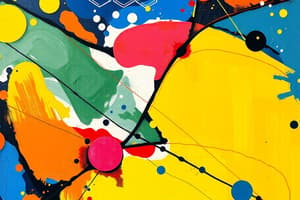Podcast
Questions and Answers
True or false: Ionic bonding occurs when metals react with metals?
True or false: Ionic bonding occurs when metals react with metals?
False (B)
True or false: Electrons are transferred from the non-metal atoms to the metal atoms in ionic bonding?
True or false: Electrons are transferred from the non-metal atoms to the metal atoms in ionic bonding?
False (B)
True or false: The resulting compound in an ionic bonding is called a covalent compound?
True or false: The resulting compound in an ionic bonding is called a covalent compound?
False (B)
True or false: An ionic bond is a strong electrostatic force of attraction between oppositely charged ions?
True or false: An ionic bond is a strong electrostatic force of attraction between oppositely charged ions?
True or false: In ionic bonding, positive ions are formed by non-metal atoms?
True or false: In ionic bonding, positive ions are formed by non-metal atoms?
True or false: Ionic bonding occurs when metals react with non-metals?
True or false: Ionic bonding occurs when metals react with non-metals?
True or false: Electrons are transferred from the metal atoms to the non-metal atoms in ionic bonding?
True or false: Electrons are transferred from the metal atoms to the non-metal atoms in ionic bonding?
True or false: The resulting compound in an ionic bonding is called an ionic compound?
True or false: The resulting compound in an ionic bonding is called an ionic compound?
True or false: Positive and negative ions are strongly attracted to each other in an ionic bond?
True or false: Positive and negative ions are strongly attracted to each other in an ionic bond?
True or false: A dot and cross diagram models the transfer of electrons in an ionic bonding?
True or false: A dot and cross diagram models the transfer of electrons in an ionic bonding?
Flashcards are hidden until you start studying
Study Notes
Ionic Bonding
- Ionic bonding does not occur when metals react with metals, but rather when metals react with non-metals.
- In ionic bonding, electrons are transferred from the metal atoms to the non-metal atoms, resulting in the formation of ions with opposite charges.
- The resulting compound in an ionic bonding is called an ionic compound, not a covalent compound.
- An ionic bond is a strong electrostatic force of attraction between oppositely charged ions, which holds them together.
- In ionic bonding, negative ions are formed by non-metal atoms, not positive ions.
- Positive ions are formed by metal atoms, which lose electrons to become positively charged.
- The attraction between positive and negative ions in an ionic bond is strong due to their opposite charges.
- A dot and cross diagram is used to model the transfer of electrons in an ionic bonding, illustrating the formation of ions and their subsequent attraction.
Studying That Suits You
Use AI to generate personalized quizzes and flashcards to suit your learning preferences.




